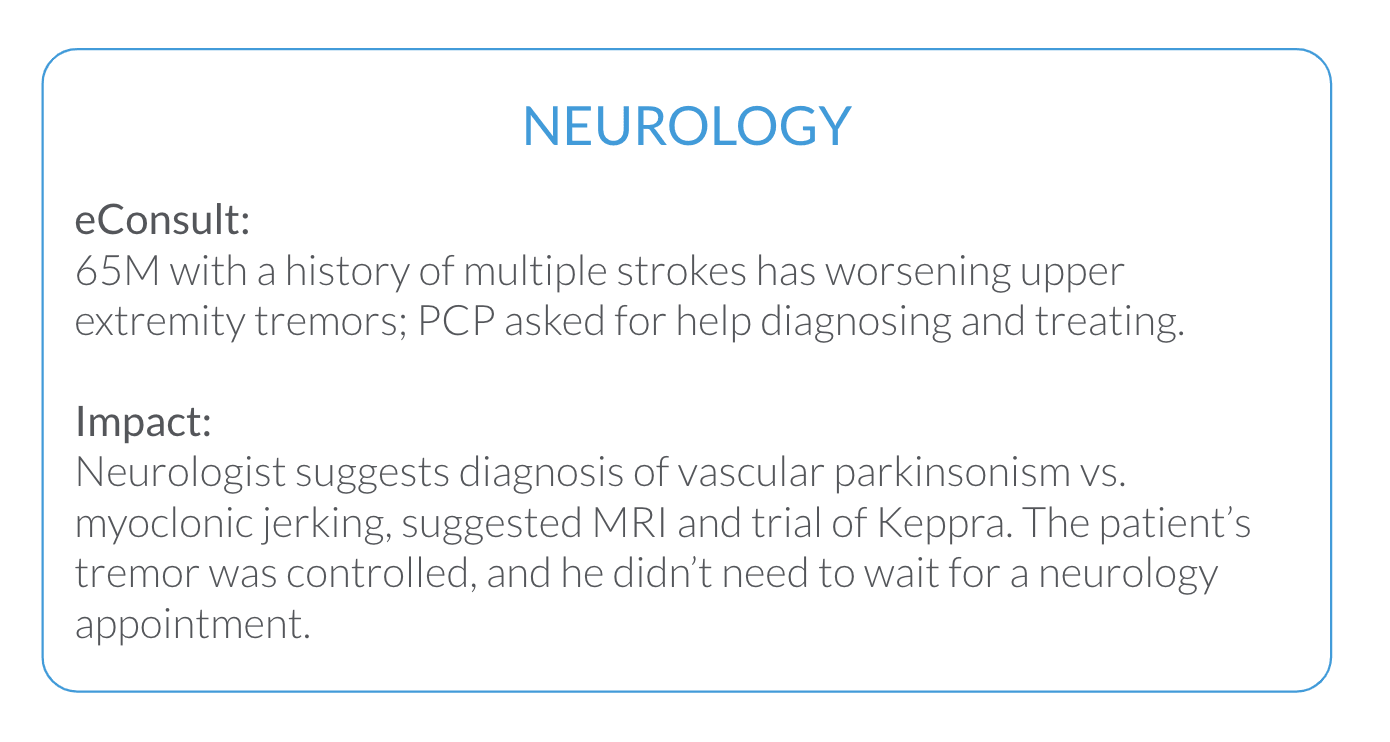
In this series, we will be discussing the common challenges to achieve clinical quality goals:
- Containment
- Care Impact
- Diagnosis
In this blog, we will focus on Care Impact.
Care Impact
The implementation of eConsults has profoundly impacted the quality and accessibility of patient care in healthcare settings. eConsults are a key clinical innovation that can assist in addressing inequities in access to specialty care. One of the critical aspects where eConsults have significantly elevated care impact is improving patient outcomes. Through eConsults, healthcare providers can collaborate more efficiently, leading to faster and more accurate diagnoses, timely treatment interventions, and better management of chronic conditions. This results in improved patient health outcomes, reduced hospital readmissions, and enhanced quality of life.
What is the impact on a patient’s care plan?
Diagnosis and Treatment of New Conditions
The care impact of eConsults is most notable in their ability to improve the diagnosis and treatment of new conditions significantly. This is particularly evident in scenarios such as the evaluation of new symptoms, interpretation of abnormal lab results and imaging studies, and assessment of changes in behavior. Through eConsults, healthcare providers can collaborate quickly and effectively, leading to more rapid and accurate diagnoses. This streamlined communication allows for prompt treatment initiation, reducing patient uncertainty and accelerating their path to recovery. Additionally, eConsults empowers healthcare teams to access a collective wealth of knowledge and resources, enabling comprehensive assessments and personalized treatment plans that optimize patient outcomes.

In a recent case involving a 65-year-old individual with a history of multiple strokes experiencing worsening upper extremity tremors, an eConsult proved instrumental in providing timely and effective care. The patient’s primary care physician (PCP) sought assistance in diagnosing and treating the tremors, prompting an eConsult with a neurologist. Through this eConsult, the neurologist suggested a differential diagnosis of vascular parkinsonism versus myoclonic jerking and recommended further evaluation through an MRI scan. Additionally, the neurologist proposed a trial of Keppra, an antiepileptic medication known for its efficacy in managing tremors. Thanks to the eConsult, the patient’s tremors were successfully controlled, and the need for a separate neurology appointment was eliminated. This expedited the diagnostic process and ensured that the patient received prompt and appropriate treatment, ultimately improving their quality of life and care experience.
Post-Hospitalization Care Transition
The impact of eConsults on post-hospitalization care transitions is noticeable, particularly in managing various medical conditions. This is exemplified by their ability to conduct efficient post-hospital reviews for conditions like congestive heart failure (CHF), chronic obstructive pulmonary disease (COPD), myocardial infarction (MI), and others. eConsults are crucial in managing post-fall incidents and addressing complications stemming from urosepsis. Through seamless remote consultations and collaborative efforts among healthcare providers, eConsults ensures that patients receive comprehensive follow-up care immediately after discharge. This proactive approach enhances patient outcomes and minimizes the risk of readmissions and complications, contributing significantly to a more streamlined and patient-centered healthcare continuum.
Chronic Disease Management
eConsults also have a significant impact on chronic disease management, providing essential support for conditions such as diabetes mellitus (DM), hypertension (HTN), and chronic kidney disease (CKD). They prove invaluable in addressing challenges associated with worsening dementia and exacerbations of various illnesses. EConsults facilitates comprehensive care planning and tailored intervention strategies for patients with chronic conditions by fostering efficient communication and collaboration among healthcare providers. This proactive approach enhances patient outcomes and improves the management of complex health issues, resulting in a better quality of life and reduced healthcare burdens.

90% of eConsults significantly impact patient care plans
Medication Review and Management
eConsults provide a streamlined platform for healthcare providers to navigate complex medication regimens, reducing the risks associated with polypharmacy and ensuring optimal treatment outcomes. The impact of eConsults on Medication Review and Management is substantial, particularly in addressing key aspects such as polypharmacy management, titration of medications for chronic diseases like hypertension (HTN) and diabetes mellitus (DM), and closing prevention gaps. eConsults enable providers to make timely adjustments and titrate medications for chronic conditions, ensuring that patients receive personalized and effective treatment plans. Primary care practitioners are now able to facilitate discussions on preventive medications and interventions, helping close gaps in preventative care and promoting a proactive approach to healthcare delivery. In essence, eConsults significantly enhance medication review and management processes, leading to safer, more tailored treatment strategies and improved overall patient care
